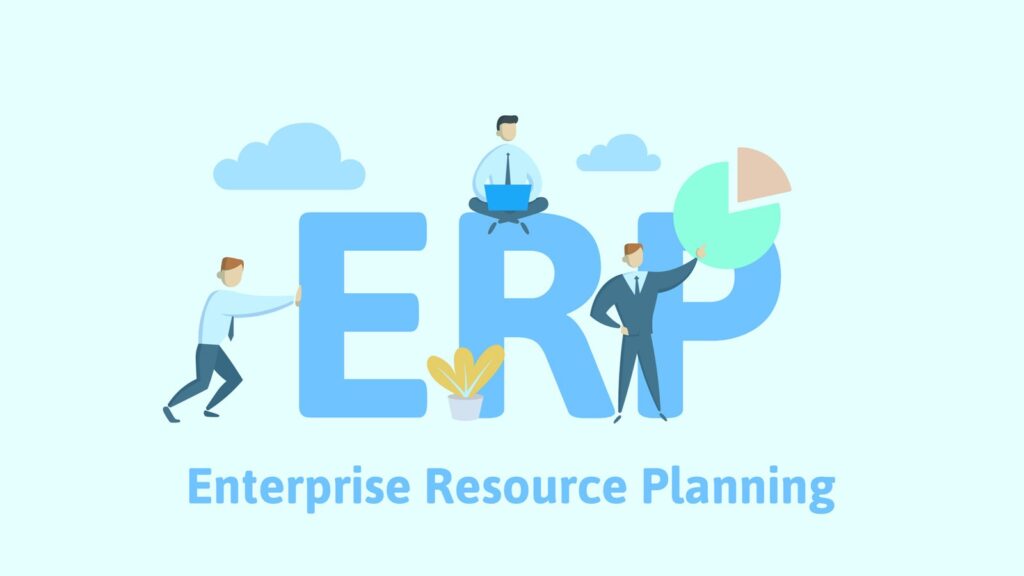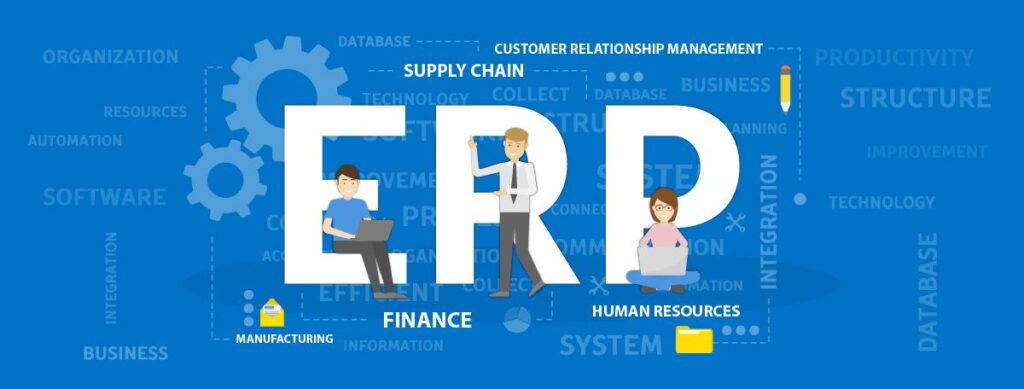WHY IS ERP IMPORTANT ?

WHY IS ERP IMPORTANT ?
Organizations that want to manage their business operations inside a centralised and integrated system employ enterprise resource planning (ERP). Companies involved in the supply chain frequently utilise ERP to keep track of all the moving elements involved in production and delivery. However, a variety of diverse industries, including those in healthcare, charitable organisations, construction, and hospitality, can make use of ERP. Organizations that need to manage their employees, clients, and inventory can all benefit from ERP. ERP allows all departments to work with the same data because it keeps all entered data in a single database. All of this data can also be arranged, examined, and turned into reports. ERP unifies customer management, human resources, financial management, business intelligence, inventory, and supply chain functions into a single system.
What are the benefits of ERP?
Software for enterprise resource planning is used to handle a variety of business operations, but how is it superior to other options? Although ERP may share some objectives with other systems, its specific qualities set it apart as a player in the software market. The following are the reasons why ERP is essential for being competitively ahead in the industry.
- Improved Productivity: The use of conventional techniques makes it impossible to avoid tiresome activities. Employees used to spend hours on tasks like creating reports, keeping track of inventory levels, maintaining timesheets, and processing orders. These procedures not only consume time but also weaken staff morale and expose you to human error. Even the best staff employees are prone to making errors after inputting the same line of data into numerous forms for the umpteenth time. Your most repetitive chores can be automated with the proper solution, thanks to an ERP. The database in ERP software avoids unnecessary labour like data entering and enables the system to quickly execute complex computations. This increases your labour ROI by giving your team members more time to complete intelligent work. Consequently, ERP boosts the productivity, effectiveness, and profitability of your business.
- Simplified Compliance and Risk Management: It may be challenging to stay on top of all the many rules placed on your organisation as it expands and conducts business in other nations. The many environmental, information security, and human resources restrictions affect even small local businesses. Fortunately, many ERP solutions are created with these rules in mind, assisting you in maintaining compliance at every level. Additionally, auditing capabilities are included in ERP software to help with recording things like chemical usage and tax obligations. This makes creating reports and sending them to the appropriate regulatory authority relatively simple. Additionally, risk management features are frequently provided by ERP. The increased accuracy and dependability of this solution improves financial management overall since accounting errors are less likely to occur. Users of forecasting software can also predict occurrences in terms of demand, labour, and money. You may make more secure budgets, timelines, and product development plans using the information at your disposal.
- Improved Collaboration : Depending on the software you are using, the features of ERP programmes may differ somewhat, but in general, all systems enhance cooperation in some manner. As was previously said, a central database plays a crucial role in what makes an ERP special. You provide your business a single source of truth to work from with this database. By minimising mistakes caused by using inaccurate data, expenses are further decreased. Furthermore, since all team members have access to the company-wide data they require, a central database lessens any hesitancy or delay throughout projects. Furthermore, there is no requirement to combine data from diverse systems or sources.There is no worry because everything is gathered, saved, shared, andIf your staff is repeatedly inputting the same customer data into various platforms, it may be difficult to explain this. When it may be easily prevented, human error enters your operations without an ERP. accessed through a single system.
- More Money Saved: Even though several suppliers have changed their pricing policies recently, ERP solutions still require a significant financial commitment. For many, the program’s high expenditures alone might make it seem doubtful that it would actually save your company any money at all. However, after you get over the price shock, it’s simpler to understand how ERP may deliver a fantastic ROI. First, ERP integrates a number of your organization’s systems that may now be dispersed. Your personnel will have access to all the resources they require for their jobs, from product development to accounts payable, from a single centralised system. You can help your team use their time more productively by integrating systems. Users don’t have to search through many systems looking for information while using ERP. The central database makes it much simpler to access information. Additionally, ERP helps your business save money by removing the requirement for users to receive multiple systems-specific training. As a result, less money is spent on training and less work is put into the logistics. You simply need to get in touch with one vendor, rather than booking many training sessions with several separate suppliers.
- Better Analytics: Your analytics and reporting will benefit from having a consolidated store of data. An ERP is a great business intelligence tool since it captures and saves all the data users enter. ERP software enables your team to produce numerous reports more quickly and easily as long as your provider offers robust capabilities. Without an ERP, it would need days of research and compilation to provide the same reports. When executives initially connect into the system, they may view reports on the customisable dashboard that is offered by the majority of ERP packages. These reports might be anything from income and spending statements to unique KPIs that provide information about certain operations. Making smarter decisions more quickly is made possible for you and your team by having instant access to these reports. You no longer need to rely on your IT team to produce the reports you require. Last but not least, reports often include access levels, ensuring that only relevant employees view important corporate data.
- Happier Customers: Never before has managing your clients been so crucial. In this era of digital technology, more and more people are looking online for guidance on what to dress, what to eat, and how to conduct their lives. The importance of past customer evaluations has increased due to the fact that 84 percent of consumers trust internet reviews just as much as they would a friend. Offering goods and services with the needs of the consumer in mind is the greatest method to increase customer happiness. There are several ways that ERP offers this. First, most enterprise resource planning (ERP) systems come with or can be readily connected with a customer relationship management (CRM) solution. Your CRM may access data from several company processes thanks to an ERP.
- Improved Inventory Monitoring: Monitoring and controlling their rising inventory levels is a significant concern for developing businesses. Barcoding, RFID tags, and serial numbers are all used by ERP to track your inventory at every point in the supply chain. With the aid of these tools, you can keep track of the inventory levels in various warehouses, the things that are being transported, and the products that are ready for sale on the shelves. The pick, pack, and ship process is substantially optimised because of the greater warehouse visibility, which takes away all of the uncertainty. Reporting is strengthened by inventory monitoring as well since tracking systems produce more precise data. Users may set up unique KPIs to track which goods move the most quickly, indicating more demand, and which result in rising carrying costs. Warehouse managers may obtain real-time data on inventory with the increased precision afforded by ERP.
- Improved Production Planning and Resource Management :ERP oversees production in addition to inventory management. ERP offers visibility into every aspect of production, including shop floor operations. This gives users the ability to maximise capacity by optimising production schedules, machinery, and manpower. Your Bill of Materials (BOM) and fixed assets are also managed by ERP. Users may simply generate and amend BOMs using this programme, and they can also keep track of all past modifications. Fixed asset management enables users to plan equipment maintenance to minimise unplanned downtime, enhancing your profitability and connections with your supplier chain.
These many benefits of ERP allow an organisation to succeed. From where we are based, Kerala our company Zeekoi has developed a similar ERP with all the amazing benefits mentioned above. ZONAR is the perfect ERP for any small or medium business owner to change their course of business in the market.
ZONAR ERP
THE FLAGSHIP ERP
We Customize Zonar or Develop software that helps to run any business software you need.


